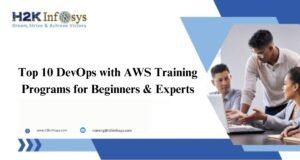The software industry in 2025 is all about speed, scalability, and security. Companies are deploying features daily, fixing bugs on the fly, and constantly optimizing user experiences. In this high-pressure environment, traditional software development practices fall short. This is where DevOps Tools become indispensable.
DevOps is an approach that bridges development and operations and relies heavily on automation, collaboration, and continuous delivery. But it’s not just about culture and process; it’s about using the right DevOps Tools to make things work seamlessly. Whether you’re building CI/CD pipelines, managing infrastructure as code, or ensuring real-time monitoring, the tools you choose will define your success.
If you’re a developer, operations engineer, or someone pursuing DevOps Training, understanding and mastering the best DevOps Tools is critical. This blog breaks down the top 10 tools you simply can’t afford to ignore in 2025 and why each one matters in today’s fast-paced tech landscape.
What Is DevOps?
DevOps is a blend of Development (Dev) and Operations (Ops). It is a set of practices, cultural philosophies, and DevOps tools that aim to shorten the software development life cycle while delivering features, fixes, and updates more frequently and reliably.
DevOps encourages collaboration between software developers and IT operations teams. Instead of working in silos, both teams work together throughout the product lifecycle from planning to development, testing, deployment, and monitoring.
What Is a DevOps Tool?
A DevOps tool is any software that helps automate, streamline, or support the various stages of DevOps practices such as code integration, testing, deployment, monitoring, and infrastructure management.
These DevOps tools help:
- Automate manual tasks
- Ensure consistency and reliability
- Reduce errors
- Improve communication between teams
Examples include tools for CI/CD, containerization, infrastructure as code (IaC), and monitoring.

Benefits of DevOps and DevOps Tools
Here are the top benefits of using DevOps tools in your software lifecycle:
- Faster Delivery: Automating processes reduces time-to-market.
- Improved Collaboration: Dev and Ops teams work together more efficiently.
- Higher Quality Releases: Continuous testing ensures fewer bugs.
- Scalability: Infrastructure can scale easily through automation.
- Better Security: DevSecOps tools integrate security into development.
- Increased Reliability: Monitoring and alert systems detect issues early.
- Cost Efficiency: Streamlined workflows reduce overhead.
Why DevOps Tools Matter More Than Ever
In 2025, the pace of software development is faster than ever. Businesses are pushing to release updates, patches, and new features daily. To keep up with this demand, DevOps practices have become the cornerstone of efficient, reliable, and secure software delivery. But DevOps alone isn’t enough. The DevOps tools you use define the effectiveness of your pipeline.
Whether you’re just starting with DevOps Training, or already working through a DevOps course, knowing the right DevOps tools is critical. Here, we highlight the top 10 DevOps tools that are essential for developers, engineers, and IT teams in 2025.
1. CI/CD Automation Tools
DevOps tools for Continuous Integration and Continuous Deployment (CI/CD) are at the heart of DevOps. These tools automate integration and delivery, making deployments faster and more reliable.
Key Features:
- Automated build and test pipelines
- Seamless code integration
- Rollback capabilities
Why It Matters in 2025: CI/CD DevOps tools support the demand for daily releases while maintaining code quality.
2. Infrastructure as Code (IaC) Tools
IaC DevOps tools allow teams to manage infrastructure using configuration files, enabling repeatable and scalable deployments.
Key Features:
- Declarative configuration
- Version control compatibility
- Automated provisioning
Why It Matters in 2025: These tools make complex infrastructure management predictable and automated.
3. Containerization Tools
Containerization DevOps tools package applications with their dependencies, making them portable and consistent across environments.
Key Features:
- Lightweight, portable environments
- Platform compatibility
- Easy deployment and rollback
Why It Matters in 2025: Containers ensure consistency and efficiency in hybrid and cloud-native deployments.
4. Configuration Management Tools
These DevOps tools automate environment configurations, eliminating human error.
Key Features:
- Declarative languages
- Synchronization
- Enforced configurations
Why It Matters in 2025: Automation ensures consistent, secure configurations across infrastructure.
5. Monitoring and Logging Tools
Monitoring and logging DevOps tools help detect system issues in real-time and provide insight into performance.
Key Features:
- Real-time alerts
- Dashboards and metrics
- Root-cause analysis
Why It Matters in 2025: These tools minimize downtime by enabling proactive troubleshooting.
6. Collaboration and Communication Tools
Collaboration DevOps tools bridge the gap between Dev, Ops, and QA.
Key Features:
- Workflow integrations
- Notification systems
- Shared dashboards
Why It Matters in 2025: Cross-team visibility ensures smooth operations and faster issue resolution.
7. Security Integration Tools (DevSecOps)
These tools embed security early into development pipelines.
Key Features:
- Vulnerability scans
- Compliance checks
- Threat modeling
Why It Matters in 2025: With rising cyber threats, secure-by-design is a must.
8. Testing and QA Automation Tools
These tools automate testing to ensure continuous validation.
Key Features:
- Unit, UI, and integration testing
- Continuous feedback loops
- Cross-browser and platform testing
Why It Matters in 2025: They help deliver robust applications without delay.
9. Orchestration Tools
These tools manage container lifecycles and scale applications as needed.
Key Features:
- Auto-scaling
- Load balancing
- Service discovery
Why It Matters in 2025: Managing microservices manually is unscalable these tools bring efficiency.
10. Artifact Repository Management Tools
These tools store and organize software artifacts, binaries, and dependencies.
Key Features:
- Version control
- Dependency management
- Secure access control
Why It Matters in 2025: Clean artifact handling ensures smooth CI/CD processes and faster builds.
Real-World Example: Why the Right Tools Matter
Imagine a team rolling out a new feature in a high-traffic e-commerce app. With the right CI/CD tool, they automate build and test cycles. A containerization tool ensures the app runs consistently on both staging and production. Orchestration handles scaling during a sale, while monitoring alerts the team of a performance spike.
This real-world coordination is only possible with the right DevOps tools in place.
How DevOps Training Helps You Master These Tools
Whether you’re an aspiring engineer or experienced professional, mastering DevOps tools starts with structured learning. At H2K Infosys, our DevOps training online and DevOps certification training programs cover all major tools used in the industry today.
The DevOps course includes real-time labs, hands-on exercises, and project simulations. From IaC to testing, you’ll gain expertise in DevOps tools that employers look for.
We also offer DevOps training and placement to help you secure top roles faster.
Key Takeaways
- DevOps tools are essential for agile, secure, and scalable software delivery.
- Mastering these tools boosts your productivity, deployment speed, and software quality.
- Practical, hands-on DevOps training provides a competitive edge in the job market.
- Staying current with top DevOps tools in 2025 sets you apart in the tech world.
Conclusion
Learning DevOps isn’t just about process knowledge, it’s about using the right DevOps tools effectively. These top 10 tools are redefining how modern software is built and delivered. Enroll in H2K Infosys’ DevOps course to gain real-world experience and prepare for future-ready roles.
Master the most in-demand DevOps tools and start building the future of software today.





























